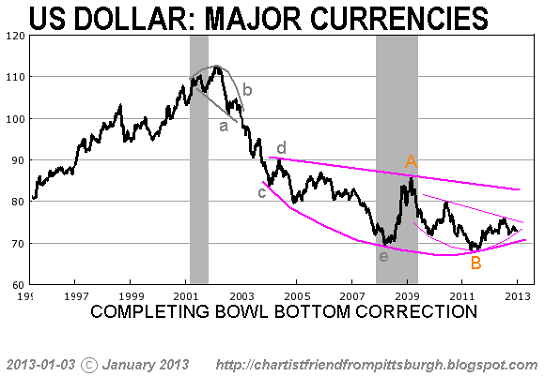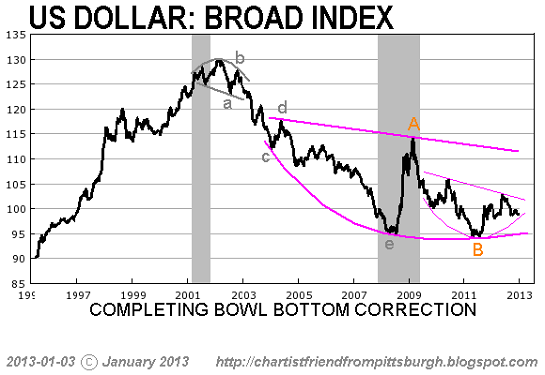One of the most glaring omissions in mainstream financial-media stock market commentary is the connection between the U.S. dollar's relative value and corporate earnings. I have often commented on this bullish consequence of a weakening dollar.
50%-60%+ of global corporate earnings and profits are non-U.S., i.e. booked overseas in a currency other than the U.S. dollar (USD). As the dollar weakened, global corporate profits skyrocketed as earnings in euros, yen, etc. rose when stated in dollars.
In other words, overseas profits expand as if by magic when stated in dollars.
When the euro and the dollar were 1-to-1 back in the early 2000s, then 100 euros of profit converted to $100 when stated in dollars. When the euro rose to $1.60, then the same 100 euros of profit earned by the U.S. corporation in Europe converted to a stupendous $160 in profit when stated in dollars.
This explains why the Fed has been so keen to trash the dollar: it magically increases corporate profits and thus drives stocks higher. The mainstream financial media's explanation for the weak-dollar policy is that the Fed is anxious to increase exports, but this is a sideshow; exports make up less than 9% of the U.S. GDP. The real action is in corporate profits, which thanks to the weak dollar are near all-time highs of $2 trillion, about 14% of the nation's entire GDP.
Record Corporate Profits (Economix, N.Y. Times)
As the dollar strengthens, overseas profits will decline when stated in dollars.
Courtesy of Chartist Friend from Pittsburgh, here are two charts showing the long-term trend in the U.S. dollar: up.

No wonder corporate profits have risen strongly since 2002, other than that brief spot of bother in 2008: the dollar's relentless decline magically boosted global corporate profits. Since many Fortune 100 U.S. companies (McDonalds, etc.) derive 2/3 of their revenues overseas, this foreign-exchange (FX) created boost in profits is a dominant dynamic in U.S. corporate profits.

If we combine the FX drag of a rising USD with the cyclical top in corporate earnings described in What If Corporate Earnings Have Topped Out?, we discern a potential double-whammy on earnings and thus stock market valuations.
My new book Why Things Are Falling Apart and What We Can Do About It is now available in print and Kindle editions--10% to 20% discounts.
Things are falling apart--that is obvious. But why are they falling apart? The reasons are complex and global. Our economy and society have structural problems that cannot be solved by adding debt to debt. We are becoming poorer, not just from financial over-reach, but from fundamental forces that are not easy to identify or understand. We will cover the five core reasons why things are falling apart:
 1. Debt and financialization
1. Debt and financialization
2. Crony capitalism and the elimination of accountability
3. Diminishing returns
4. Centralization
5. Technological, financial and demographic changes in our economy
 1. Debt and financialization
1. Debt and financialization2. Crony capitalism and the elimination of accountability
3. Diminishing returns
4. Centralization
5. Technological, financial and demographic changes in our economy
Complex systems weakened by diminishing returns collapse under their own weight and are replaced by systems that are simpler, faster and affordable. If we cling to the old ways, our system will disintegrate. If we want sustainable prosperity rather than collapse, we must embrace a new model that is Decentralized, Adaptive, Transparent and Accountable (DATA).
We are not powerless. Not accepting responsibility and being powerless are two sides of the same coin: once we accept responsibility, we become powerful.
10% discount on the Kindle edition: $8.95(retail $9.95) print edition: $24 on Amazon.com
To receive a 20% discount on the print edition: $19.20 (retail $24), follow the link, open a Createspace account and enter discount code SJRGPLAB. (This is the only way I can offer a discount.)
| Thank you, Clyde D. ($5/month), for your superbly generous subscription to this site -- I am greatly honored by your support and readership. | Thank you, Jack T. ($25), for your splendidly generous contribution to this site --I am greatly honored by your support and readership. |
